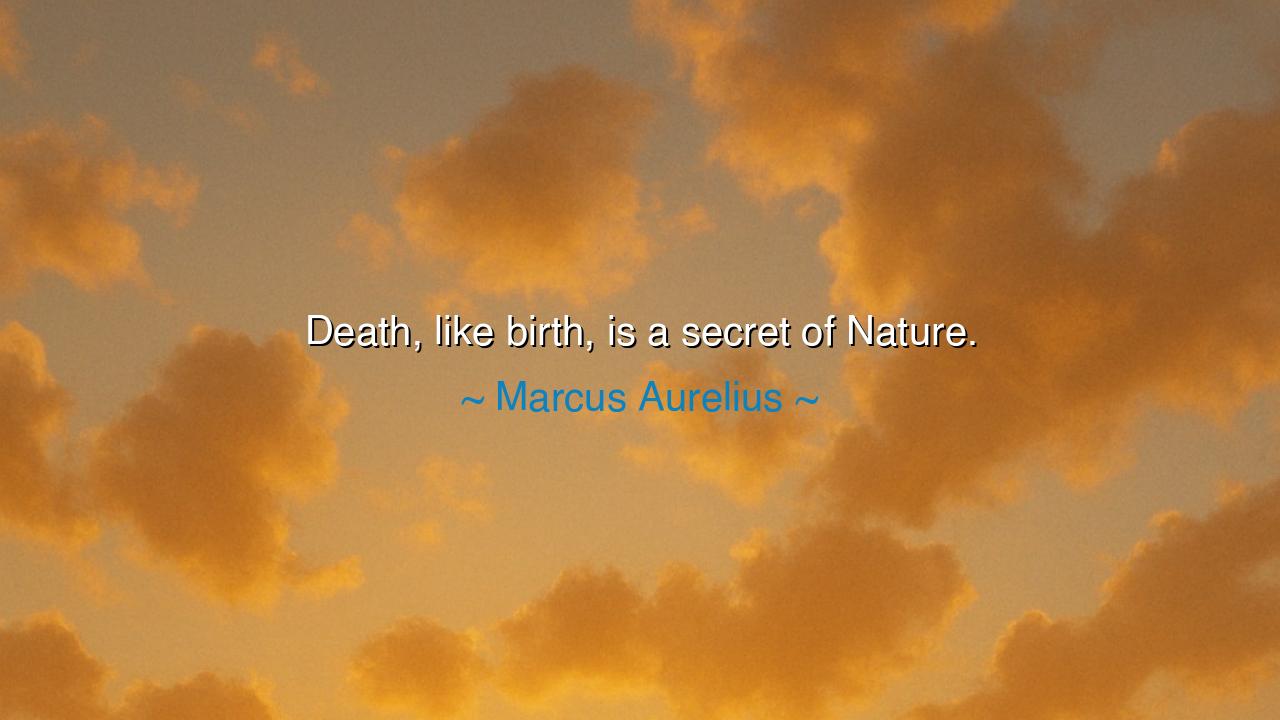
Death, like birth, is a secret of Nature.






"Death, like birth, is a secret of Nature." So spoke Marcus Aurelius, the philosopher-king, who saw the world not through fear but through wisdom. In this brief saying lies an ocean of truth: that life and death are not opposites, but companions, forever walking hand in hand through the corridors of existence. Birth enters softly, cloaked in mystery, and death departs in the same silence. Both are gateways, veiled in the same sacred fog of Nature’s design—the breath drawn in and the breath released, each part of one eternal rhythm.
The emperor, burdened with the rule of Rome and the sorrows of men, knew that no crown could protect him from mortality. He had seen warriors fall, lovers die, and empires crumble; yet he looked upon death not as a curse, but as a return. Just as the seed must vanish into the soil before the flower can bloom, so must every life sink back into the earth to make way for others. Birth and death are but two doors to the same great hall—the first opening into the light of the world, the second into the deeper light beyond sight.
Think of the mighty Socrates, who, when condemned to drink the hemlock, spoke calmly of the soul’s journey. “Shall I fear death,” he asked, “when I do not fear sleep?” His serenity baffled his disciples, for he saw what Marcus would later put into words—that death is natural, not alien, that the same force that brings a child crying into the world also leads the old man gently from it. The mystery of existence is not divided; it is one continuous unfolding. And though our minds cannot pierce its veil, our hearts can feel its order.
Even in the smallest creatures, the secret holds. The butterfly dies when its time is done, leaving behind eggs that soon awaken to life. The forest burns, and from the ashes, green shoots rise. The river loses itself in the sea, yet the sea gives birth again to clouds that rain upon the mountains. Nature reveals her truth through cycles: creation and dissolution, arrival and departure, forever balancing the scales of being. To resist this law is to resist life itself.
So when we weep at the passing of one we love, we must remember: we are not watching an ending, but a transformation. As birth shrouds the soul in flesh, death unveils it once more to eternity. The ancients saw this in the stars—Orion setting beyond the horizon, only to rise again in another season. The wise do not mourn the setting sun, for they know it will rise in another land.
The lesson is this: do not fear the secret, for it is not meant to be conquered by thought, but honored by understanding. When birth visits, greet it with reverence; when death approaches, meet it with peace. Both belong to the same divine order that sustains the cosmos. To live rightly is to live in harmony with Nature’s rhythm, accepting her mysteries without pride or despair.
In your own days, therefore, live not as though death were a thief in the night, but as though it were a teacher waiting at the end of the road. When you rise in the morning, remember that each dawn is a birth; when you rest at night, remember that each sleep is a small death. Practice gratitude for both. Live simply, love deeply, and let go gracefully, for those who understand that life and death are one do not cling—they flow.
Thus, the emperor’s words still echo across centuries: Death, like birth, is a secret of Nature. Do not demand to know it; learn instead to trust it. For in trusting, you align yourself with the eternal harmony that moves stars, seas, and souls alike.






AAdministratorAdministrator
Welcome, honored guests. Please leave a comment, we will respond soon